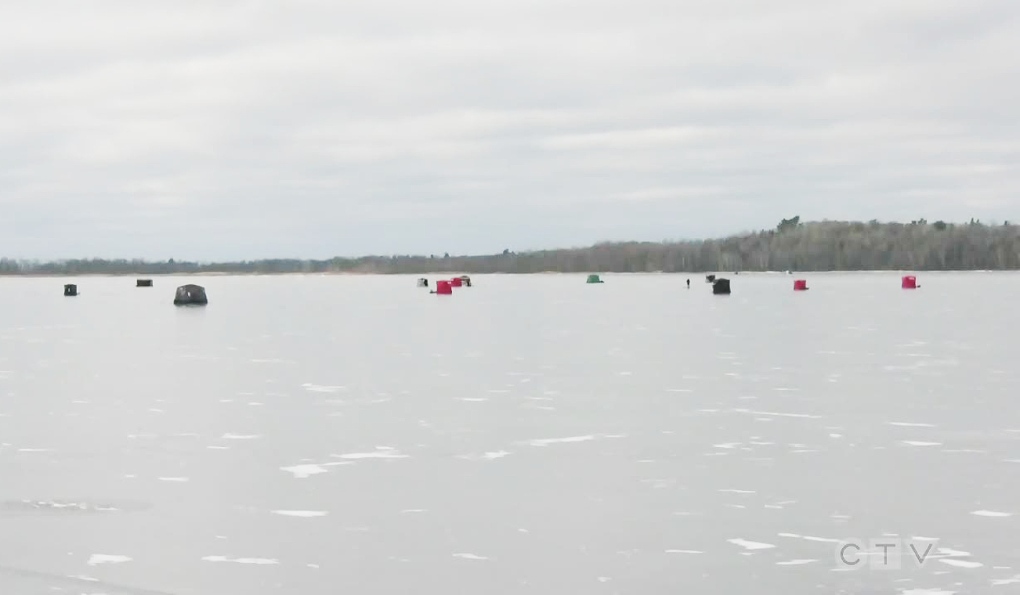Northern fire officials stress safety during ice fishing season
Fire firefighters are stressing that people keep safety top of mind this ice fishing season as the first few dozen ice shacks are already out on Callander Bay.
Anglers are eager to get out on the lake now that the season is underway.
North Bay Fire Chief Jason Whiteley is taking the time to remind ice fishing enthusiasts to make sure the ice is thick enough to be out there.
"They should really know the ice that they're going on,” Whiteley said.
“Some of the smaller back lakes are icing up nicely, but the bigger lakes like Lake Nipissing and Trout Lake are wide open in a lot of areas."
The fire department stresses people need to note the colour of the ice and measure its thickness before stepping foot on it.
 Fire firefighters are stressing that people keep safety top of mind this ice fishing season as the first few dozen ice shacks are already out on Callander Bay. (Photo from video)
Fire firefighters are stressing that people keep safety top of mind this ice fishing season as the first few dozen ice shacks are already out on Callander Bay. (Photo from video)
Ice is never uniformly thick. Dangerous areas frequently occur around river mouths, underwater springs, beaver dams, and dark, rocky shorelines. Clear blue ice is generally the strongest, while white, honeycombed ice is only half as strong.
"The wind and the current, they all have an effect on how the ice sets up and the type of ice,” said Whiteley.
Samantha Simpkin, owner of Fish Bay Marina, has decided to delay renting her 16 huts for lake use until mid-January, waiting for better, colder conditions.
"There's still open water on the lake, which is where we need to go,” Simpkin said.
“Where we go is not safe by any means. It needs to be consistently -10, -15, -20 overnight to really build that ice."
It's recommended if there's only three inches of ice or less, then stay off. Four inches is OK for skating or ice fishing, between five and six inches is required for ATVs and at least 12 inches is needed for bigger vehicles.
Fire officials are also reminding anglers to have smoke and CO alarms in their shacks.
"We have had some tragedies in the past,” said Whiteley.
“If you're using a wood-burning fireplace or propane heater or even an electric generator, have a carbon monoxide alarm."
CTVNews.ca Top Stories

Auto theft probe leads to arrest of 59 suspects, recovery of more than 300 stolen vehicles: Toronto police
Toronto police say 59 suspects are facing a total of 300 charges in connection with an auto theft and re-vinning probe.
WATCH 'It's mind-boggling': Drought reveals U.S. town submerged in the 1940s
Hundreds of people are flocking to see a rare site in Pennsylvania: remnants of a historic town that is usually underwater.
Meet Decoy Ohtani, perhaps the most valuable pet of the World Series
The Dodgers' most valuable pet: Decoy Ohtani, dog of Shohei, has become a fixture of Dodgers — and dog — fandom.
Bradley Barton's sentence upheld by appeals court in 2011 death of Cindy Gladue
An appeal has been denied to extend the sentence of an Ontario trucker who killed a woman in his Edmonton hotel room in 2011.
B.C. landlord who evicted longtime tenant, hiked rent and re-listed unit ordered to pay $16K
A landlord from B.C.’s Lower Mainland who evicted a longtime tenant only to rent out the same unit months later for more money has been ordered to compensate him $16,480.
Human remains found in Markham, Ont. in 1980 belonged to prison escapee: police
More than 44 years after human remains were found in a rural area of Markham, Ont., police are revealing that the deceased was an inmate who had escaped prison just a month before his body was found.
Manitoba RCMP identify infant human remains, asking public for help with investigation
Manitoba RCMP are looking for more information after the remains of an infant were identified.
More than half of human trafficking incidents in Canada remain unsolved
More than half of human trafficking incidents remained unsolved in Canada by police as the number of incidents increased over the past decade, according to new data released Friday.
'I couldn't stay home': Canadian with no prior military training joins Ukrainian forces
In the early days of Russia’s invasion of Ukraine, Adam Oake, a Canadian with no prior military training, sold all of his Toronto Maple Leafs memorabilia to buy a plane ticket.

































